Chelsea Wolfe: “I wanted to write heavy songs that are fun to play and that I could really lose myself in”
Meet the artist and see the rig behind one of the most singular sounds in contemporary guitar music
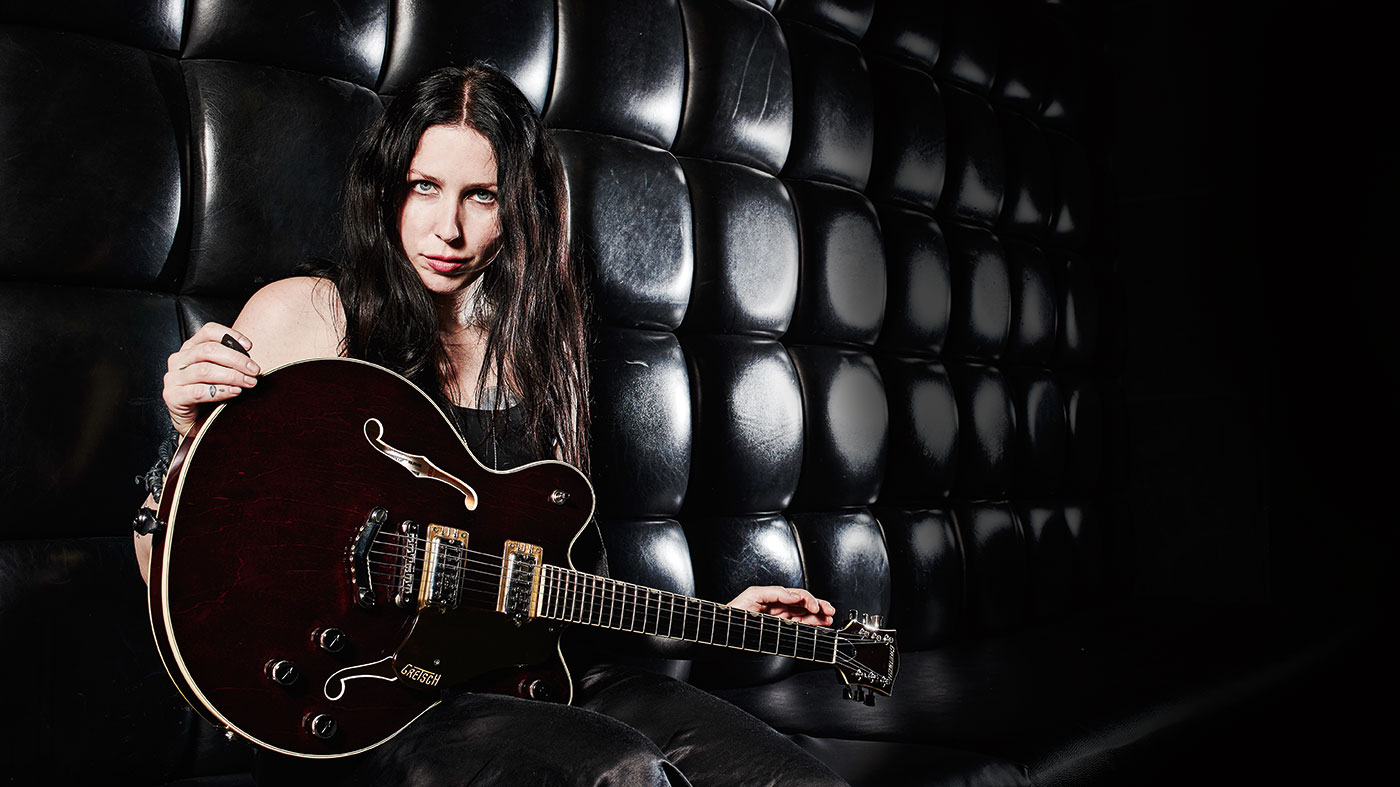
“I’ve been able to do some really cool stuff, despite being undefinable and an outcast,” Chelsea Wolfe tells us.
It’s a strange, especially cruel double-edged sword that the more different you are as a musician to anyone else around at the time, the harder you can become to ‘market’ and gain some reward for that talent. And as compelling as Chelsea Wolfe’s music is when you take the time to listen, and it really is incredible work, there’s no escaping that the Sacramento artist’s five albums to date explore wildly diverse ground that’s difficult to label in traditional terms.
Despite an undeniable but gradual rise that’s seen her solo band play on all manner of varied bills, she remains more a cult figure than we think she should be.
I think it makes it more difficult for any artist to break through when you can’t be put into a simple box
“I think it makes it more difficult for any artist to break through when you can’t be put into a simple box,” she tells us backstage in Bristol on a European tour supporting industrial behemoths Ministry.
“It’s easier to ‘sell’ someone if you can be like, ‘Oh she’s an acoustic singer-songwriter from California’ or whatever. But that’s not really all I am, I have all these different sides and influences, from doom-metal and old country, to trip-hop and I bring all those things together in my own way.
“I think it’s more difficult to get certain opportunities because some people just don’t know what to do with me, but at the same time it’s been really cool because since we can fit into a lot of different worlds we’ve got a lot of different opportunities to play at festivals we wouldn’t normally fit on, because someone saw something in us.”
Wolfe’s last two albums, 2015’s Abyss and 2017’s Kurt Ballou-produced Hiss Spun find her in an undeniably heavy era for an artist who also has a whole acoustic folk compilation under her belt (2012’s Unknown Rooms). They mix dark, dense and abrasive sounds with mesmerising tones and ethereal hooks to stunning effect on a journey into Wolfe’s world, with guest guitarists including Russian Circles’ Mike Sullivan and Queens Of The Stone Age’s Troy Van Leeuwen threading through the maelstrom.
Get the MusicRadar Newsletter
Want all the hottest music and gear news, reviews, deals, features and more, direct to your inbox? Sign up here.
There’s a lot to talk about and celebrate here, but the beginning feels the best place to start with Chelsea…
Going right back, were your musical tastes eclectic from a young age?
“Yes, definitely. Mainly because I grew up with a country musician as a father so there was old country and blues, from Johnny Cash to Led Zeppelin - they were one of my early influences through my father. And then my mum had really good taste too; she’d listen to Joni Mitchell and Bonnie Raitt, so there’s a female folk and blues artist influence from her. I was lucky to have a lot of really cool influences.”
Vision quest
You’ve followed your instincts as a musician, but have there been times when that has been difficult?
I have such a lovely audience who are supportive of what I want to do, I don’t think they want me to become more commercial
“Not really because the label I’m on, Sargent House, are very supportive of what the artist wants to do and their vision. So there’s never been this push of, ‘You should try to do this’ or some radio-edit version. I’m not saying that’s out of the question because a lot of bands have done that and been successful doing that.
“I think I have such a lovely audience who are supportive of what I want to do, I don’t think they want me to become more commercial; they want me to just be me and that has become the biggest blessing as an artist because, as I’m writing, I feel the support coming at me from all sides and it makes me want to do my own thing and want to give the authentic version of myself as an artist.”
You were in a band before you went solo, did you have to strike out alone to find your identity?
“I think so. I started as a singer-songwriter with an acoustic guitar and my voice. Then I was putting together my first record that had folk songs and rock ’n’ roll songs and I met Jess Gowrie, who is my current drummer, and we formed the band called Red Host for a few years in Sacramento where we’re both from. And that was heavy rock, hard-hitting songs and it was a lot of fun, but I just knew I had so much more in me and I wanted to be able to do different genres and bring them into my own style. So I had to just fly free for a while to find my own voice and my own style.
“Jess and I unfortunately didn’t talk for a number of years but once we reunited a few years ago it was very clear our musical chemistry wasn’t finished and luckily we started writing songs together again and that became Hiss Spun.”
It seems like it’s been a more traditional, word-of-mouth thing with people discovering your music. Does it feel like it’s been quite a gradual build for you?
“Totally, yes. I mean we’re on year seven of pretty continual touring and that’s obviously a very old-school way to gather a following and we’ve seen the growth from small clubs to some cool theatres. So it’s definitely a gradual growth and a lot of people tell me, ‘Oh I heard about you from a friend or someone recommended it.’ I don’t get a lot of press that other musicians might get. I don’t really know why, maybe because I’m like this weirdo and they don’t really know what to do with me! But it’s been cool doing things in a more organic way.”
Howling Wolfe - Chelsea's European tour rig
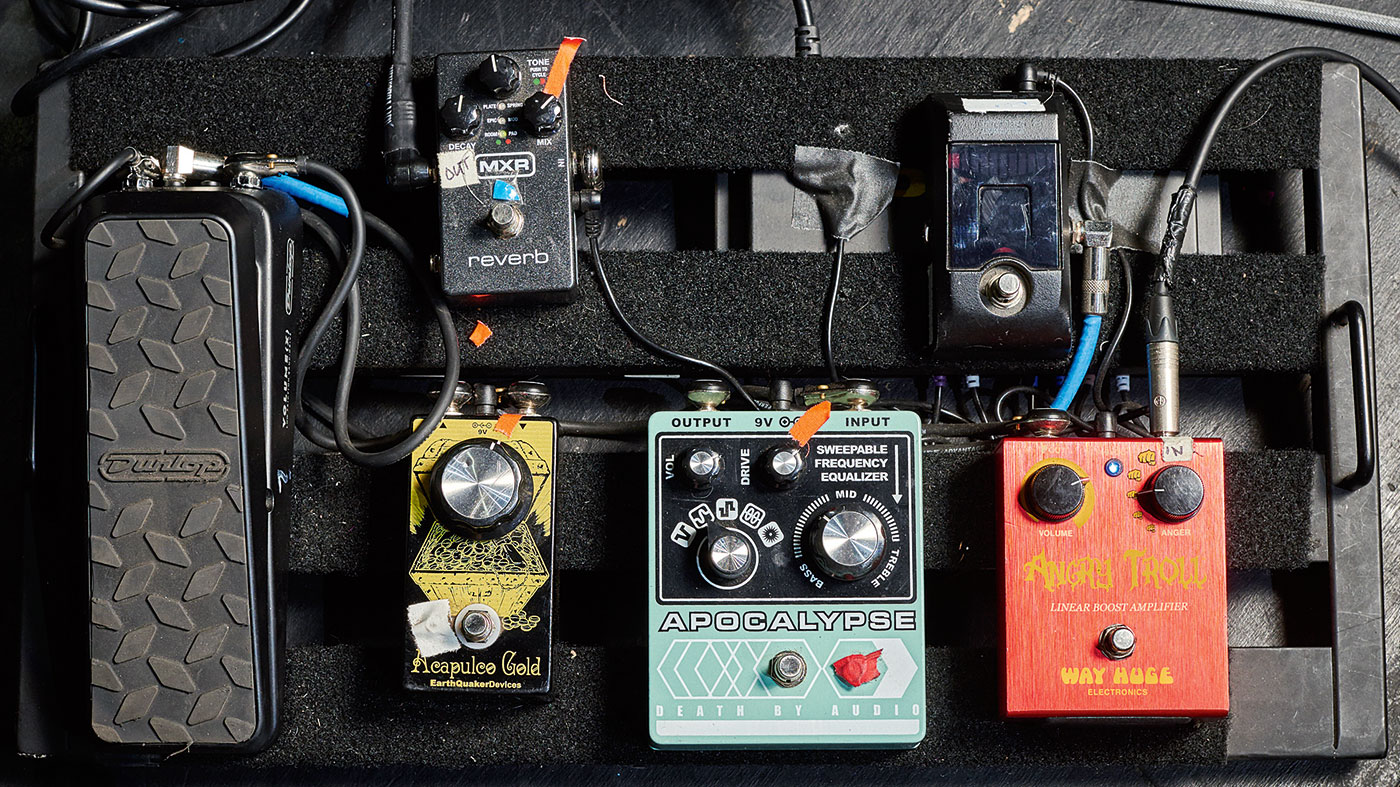
Guitar pedalboard
“When I come to Europe my ’board is super-simplified. I stick with my favourites and try not to get too crazy, especially if we’re doing opening dates and a short set. Everything is compacted.”
Dunlop DVP3 Volume
“I used to use my hand on the guitar’s volume but it’s so much more fun to use your foot. Lots of fade out of feedback.”
Way Huge Angry Troll
“We’ll get a good clean [tone] going on the Bassbreaker, then add the Angry Troll and from there add the Apocalypse or the Acapulco. This is my general tone. Sometimes I use a Speaker Cranker but I switched to this one for the tour because I was digging it. It’s got different levels of tone, so I start here.”
Death By Audio Apocalypse
“The Apocalypse was my first proper fuzz pedal. We recorded the album Abyss with John Congleton in Dallas, Texas and he had one there. I was instantly drawn to it because of the name, of course. But the second I plugged that in I knew it was going to be a defining tone for that album. So this is more for the Abyss songs, like Carrion Flowers and Dragged Out. It’s very, very heavy. You can get this world-ending massive amount of thunder and bass. But you can do a lot with it too, you can use five different settings and I use the second [War Fuzz mode and what DBA call: ‘a very full and dynamic distortion with rich harmonics and sustain’]. The tone control changes it a lot. I guess I’m drawn to pedals that are easy and fun.”
EarthQuaker Devices Acapulco Gold distortion
“This is my favourite right now and I used this a lot on Hiss Spun so a lot of the newer songs will have this one. I don’t know what they would call it but for me it’s the marriage of distortion and fuzz. It’s the perfect in-between, which makes it perfect for a more compact ’board. I love that it has one knob, that’s it. As the rhythm player, I’m happy with this setting.”
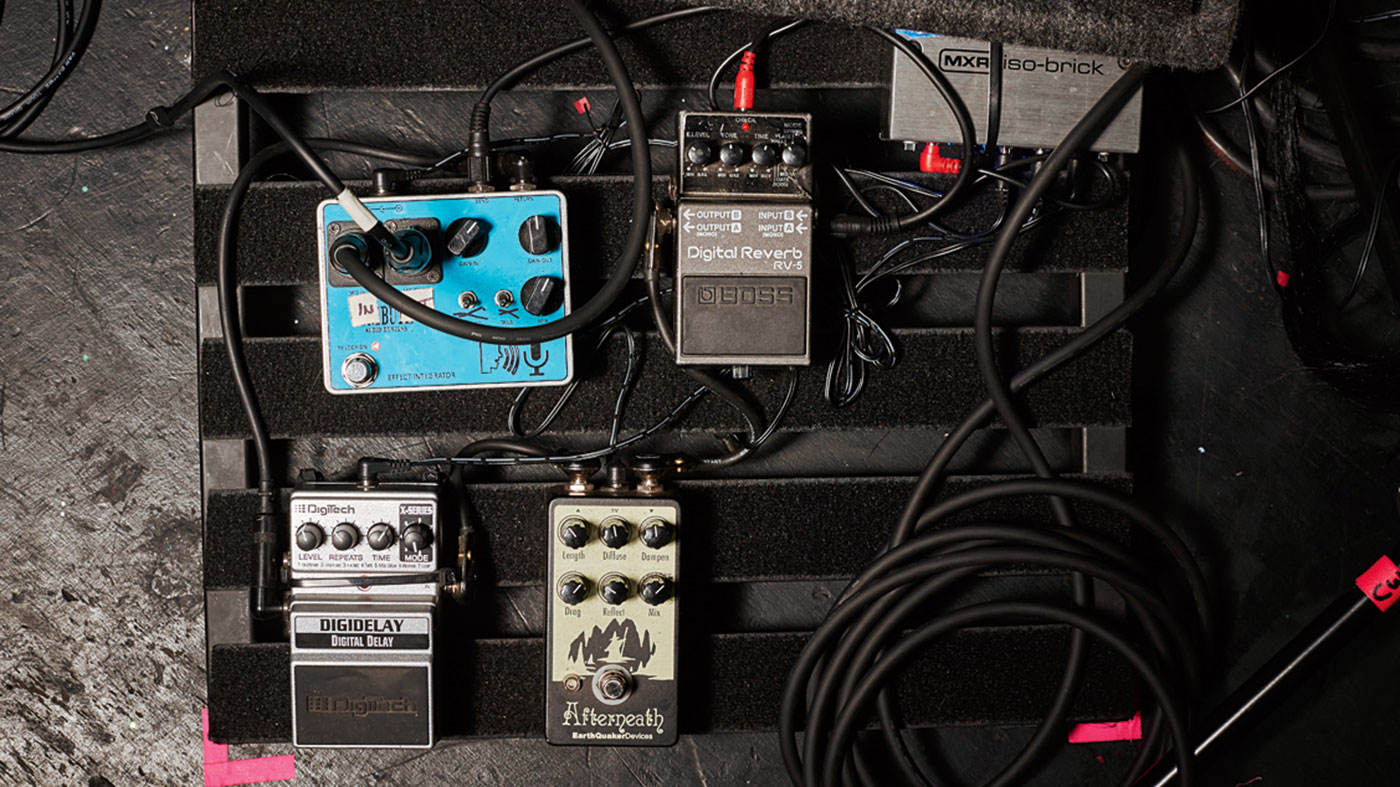
Vocal Pedalboard
“I think it drives every sound engineer crazy that [I use effects on my vocals] but I keep fighting for it because I really feel like it’s part of my sound and when I try to use a proper vocal pedal I find it doesn’t have the power. There’s something that’s a little more separated with them, it’s like the voice and then the effect but with guitar pedals it’s right there, so you can instantly hear it on your voice. In a way I feel like I’ve learned to use my voice as an instrument.”
Boss RV-5 Reverb
“I have that on a hall setting.”
DigiTech Digidelay
“I’ll fuck around with that in between the songs. I pretty much know [settings] by vision at this point instead of having to hear it.”
EarthQuaker Devices Afterneath
“I’ll click this one for a really intense dragged-out reverb.”
Tribute Audio Designs Effect Integrator
“This kind of takes the place of a DI. It’s meant for singers who go through guitar pedals as it changes the signal at the end so it’s not so crazy for front of house.”
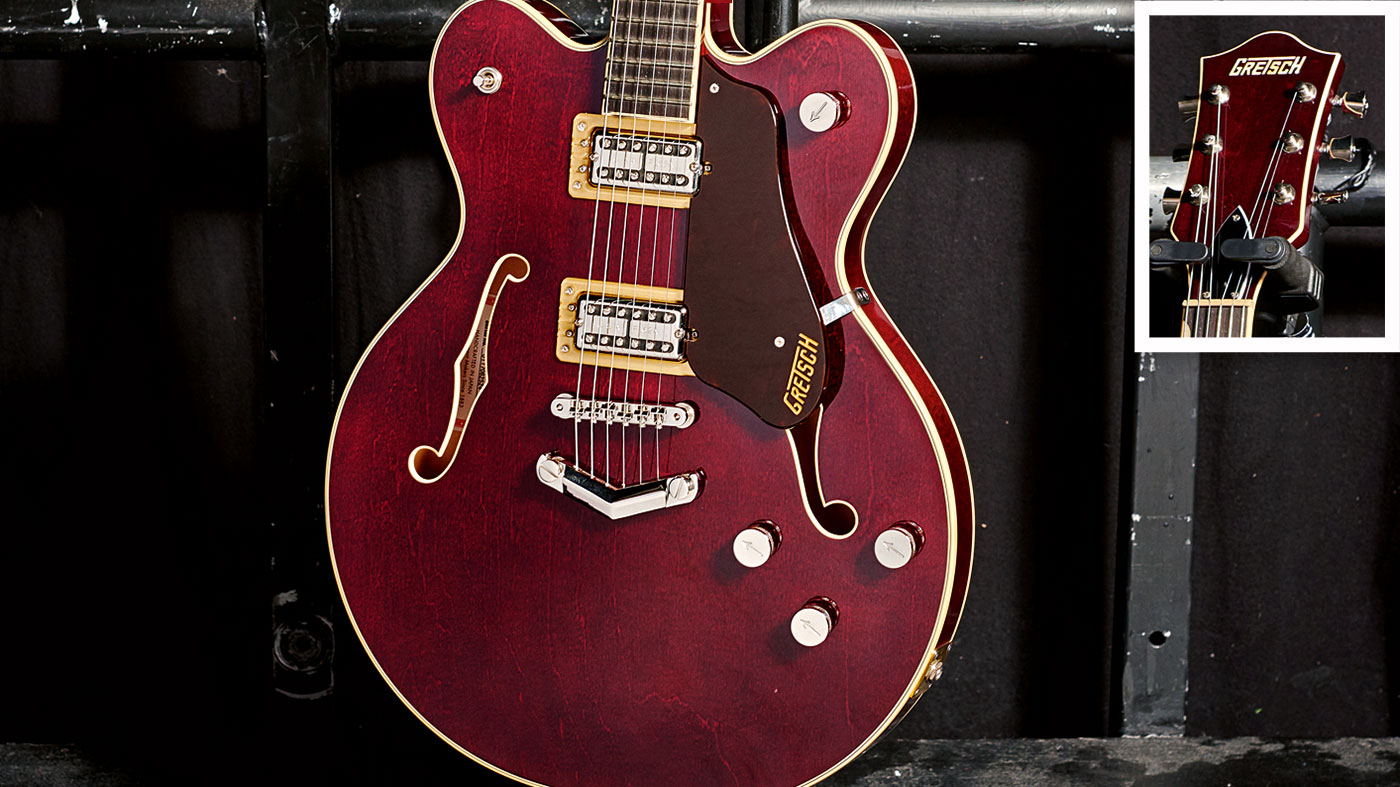
Gretsch Broadkaster
“I’ve been playing 335s for a few years and I was recently blessed with this amazing Gretsch Broadkaster that I’m in love with. It’s got an even deeper sound that’s in the same realm as a 335 but I like it so much better. It’s definitely one of my favourite guitars I’ve ever had. The colour is something I wouldn’t normally pick. Sometimes, I like all black and then sometimes I like things to look a little vintage-y, old school. It’s probably the loudest guitar I’ve ever had.”
Tuning
“I always play in D standard, it was just how I started when I was young. The first guitar I had when I was younger was a classical from when my mom was in high school and I found it in the garage. It had a broken tuning peg and I tuned it to that string, and it ended up being really close to D standard. So when I got a proper guitar I realised it was a lot better suited for my voice; standard E wasn’t great for my vocal range. Then a lot of drop C too. Twin Fawn, one of the newer songs is in CGCGGC, that one is really fun to play in.”
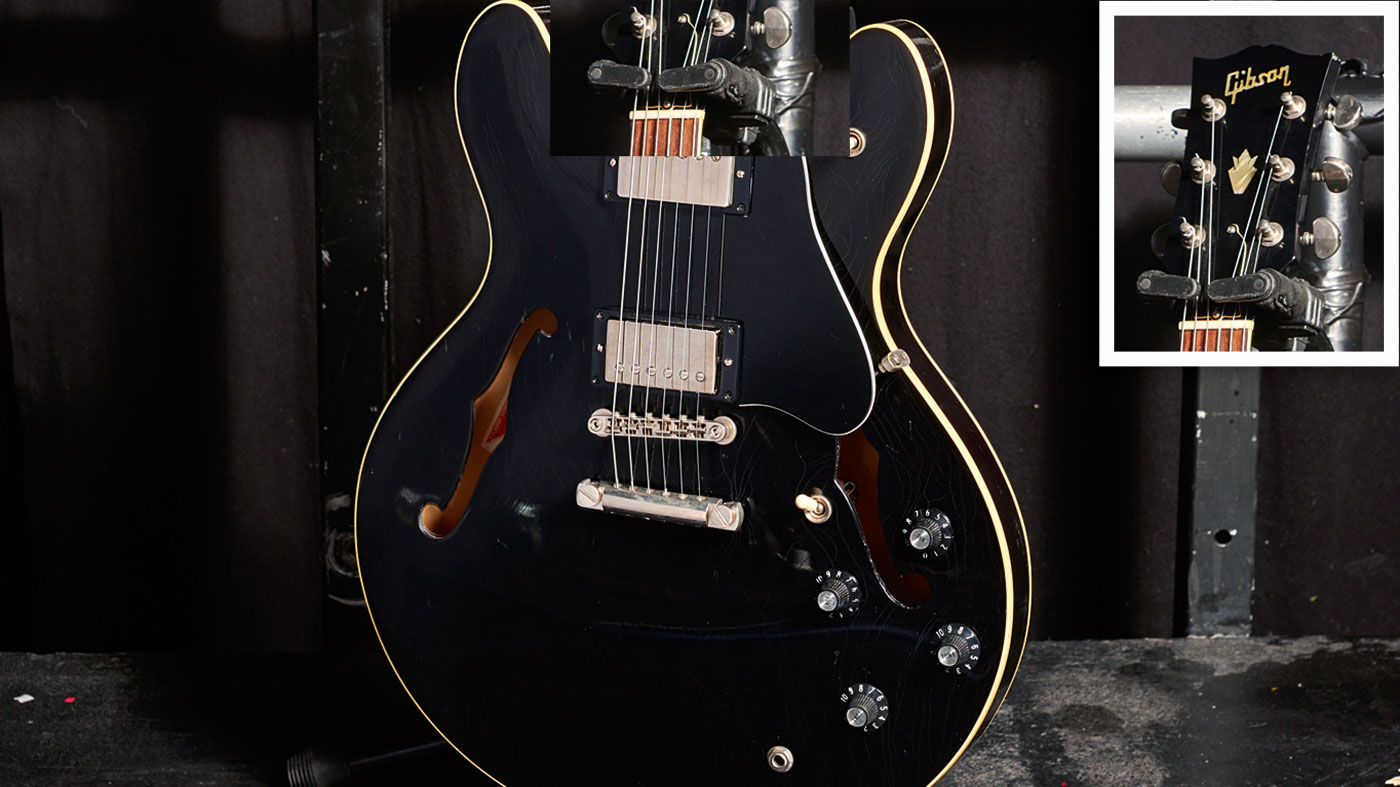
Gibson 1979 ES-335
“I got into the 335s because they have great dynamic and feel but you can also get really controlled feedback through them. Even though they’re hollowbodies it’s not an intense wail every time you turn a distortion on. You can control it and I really enjoy that for this set and lineup. For our main headline sets I’ve been using both guitars so this 335 is still in action [this guitar was also used for a lot of the tracking on Hiss Spun].”
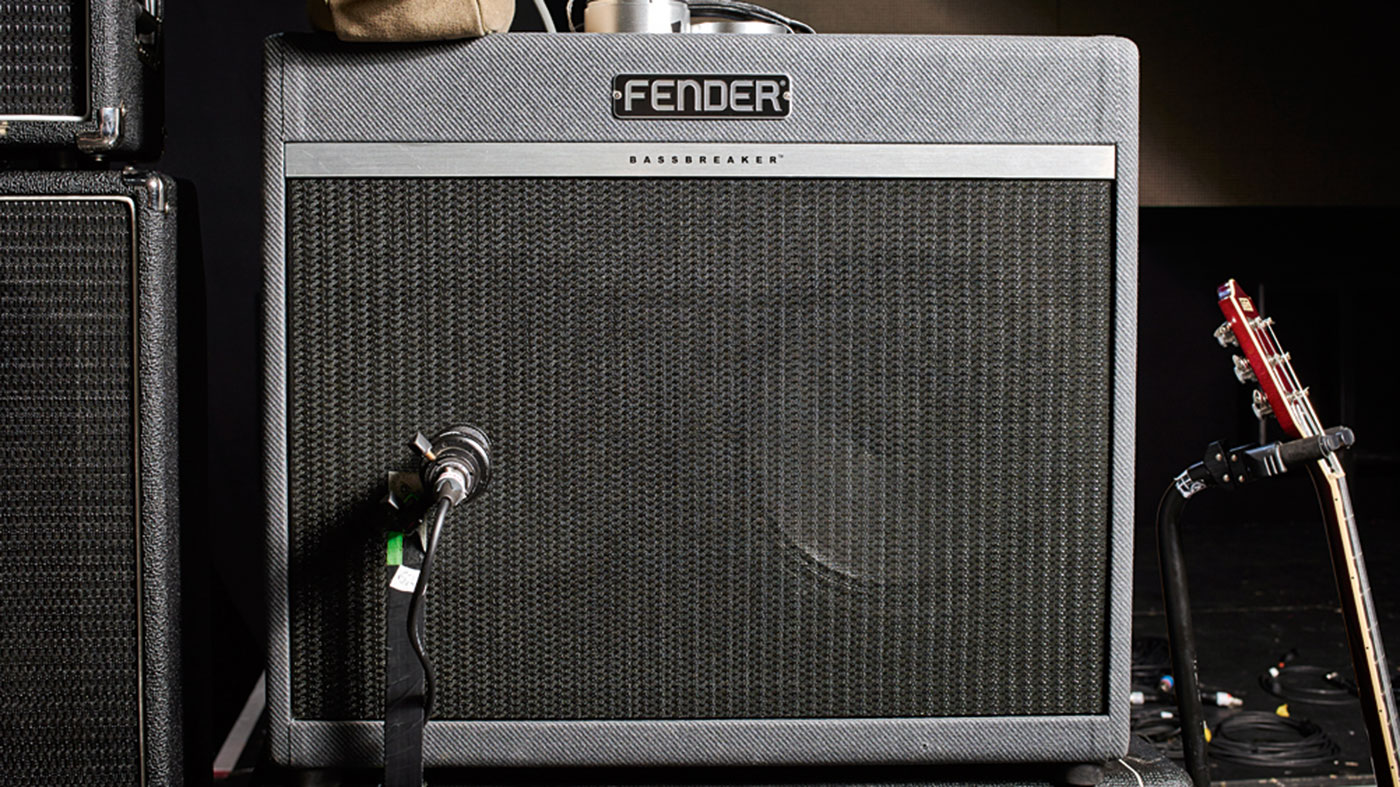
Fender Bassbreaker 45 2 x 12 combo and Hiwatt cab
“I’ve been using the Fender Bassbreaker for a few years and they were kind enough to ship one over here so the last European tours have also used it. I’m running that through a Hiwatt cab, I used to use a Hiwatt amp here too and I’m a big fan of it but for now I’m using the Bassbreaker with a second Hiwatt cab to give it more bassy low-end goodness.
“The Bassman reminded me of the Hiwatt and I was thinking of getting one in the States and then Fender came out with Bassbreaker. They asked if I’d like to try it and, obviously, it has that bassy feel and it was just perfect for what we were doing on Abyss and it carried over to Hiss Spin. I love the way it looks too.”
And those kinds of fans tend to stick with you, they’re often loyal…
“It seems like it. I see a lot of the same faces at shows and I recognise them from really early shows.”
Who have been influences on the heavier side of your music?
“Queens Of The Stone Age were a big influence for myself and my drummer, Jess. Bands that we’ve played with have ended up influencing us a lot; Swans, Sunn O))), Russian Circles even. I think playing with all these heavy bands is a reason I started going in a heavier direction for Abyss because after [third album] Pain Is Beauty I kind of imagined that I would go back to acoustic but then we were doing all these tours with heavier bands and I thought, ‘That looks like so much fun.’ I wanted to write some heavy songs that are fun to play and that I could really lose myself in.”
Is the acoustic guitar still part of your world?
“Oh yeah, I’ve actually written a ton of acoustic songs in the past year and I’ll probably focus on that next. I just follow my musical intuitions and instincts. For the last couple of records I’ve really wanted to make heavy music but now I think something in me is pulling me back to this more minimal acoustic folk, which are really kind of my origins as a musician.”
Abyss and Hiss Spun featured guest guitarists - with Russian Circles’ Mike Sullivan and then Queens Of The Stone Age’s Troy Van Leeuwen. They obviously felt like the right players to contribute to those records, but how much direction did you give them or is there a trust there from the start?
“I think it’s a bit of both. Somehow it comes together in the right way where I know this is the person I want to play on the record with these songs, and then some of the songs I’ll be like, ‘Do your thing and let’s see what happens.’ But there will be a song like 16 Psyche where I really left space for Troy and I knew that I wanted him to write a big lead part over the breakdown/bridge, whatever you want to call it, towards the end of the song. It was kind of a back and forth situation where he would play something and I would say, ‘Focus on that part.’ It was really cool to have a great player put so much trust in me as I was putting so much trust in him.”
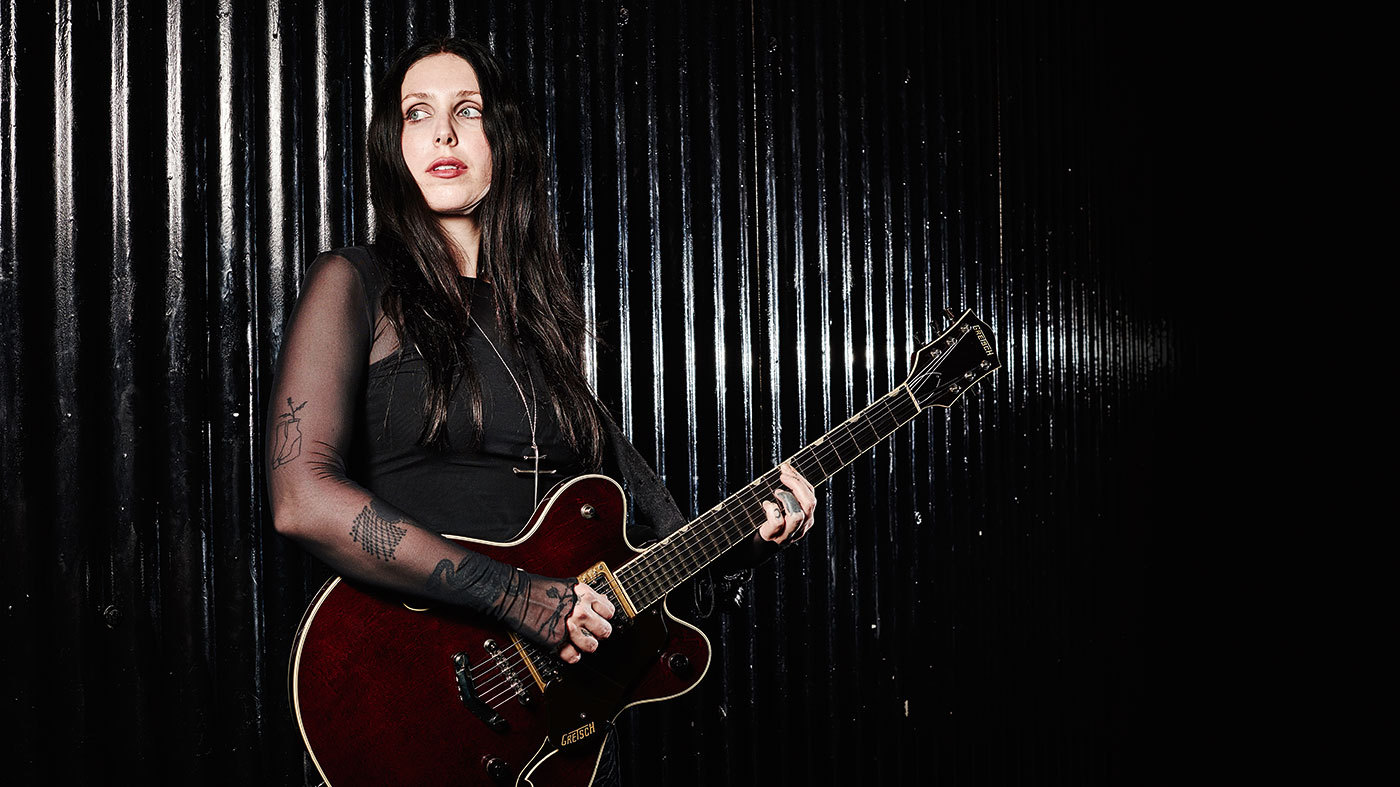
Flooring it
On Hiss Spun there’s also more of a band-in-a-room dynamic than ever before, is that reflective of the creative process?
“Yes, I wanted this one to be more collaborative and more as a band. So we did a lot of jamming together, Jess and Ben [Chisholm, bass player and guitar] and I. Also we’d bring in different lead guitar players to add some flourishes. But a lot of it was just the three of us jamming out. The traditional rock ’n’ roll process of songwriting, and also Ben wrote a lot of the guitar parts. There’s more of his vibe and his influence there, which is cool.”
Do you find in that context there are more happy accidents with things that happen in the moment?
Our friend sent us the sound of a tractor scraping bottles up off the floor... that ended up becoming the basis for Scrape
“Yes, totally. I can completely understand why there are people who just jam in their garage with friends and don’t ever play shows or anything. That’s really the most fun part - having some drinks and jamming with your friends. Coming up with these cool ideas. That’s even more fun to me than playing live so, yes, I think a lot of happy accidents come out of that.”
Are some of what sound like electronics on Abyss and Hiss Spun actually guitar? Do things start to blur between those worlds?
“Probably yes, because Carrion Flowers, a song that I would consider to be an electronic song, is actually a bass part that’s run through some pedals into speakers, recorded from there and then run through even more pedals. So we kind of make our own electronic sounds and we like to sample things a lot.
“Even just upstairs there’s a crazy old fan that’s making some really cool patterns so I recorded that and I’m sure I’ll use that in a song later. Ben and I are always collecting weird sounds that we’ll put into MIDI or Ableton, twist it around or top little parts of it and make a totally new beat.”
What’s the strangest sample you’ve ever captured?
“I think the strangest one so far is probably the track Scrape, which is the final song on Hiss Spun and the final song in the set too. Our friend was working at a recycling centre and I think we asked him to take some samples of weird sounds. So he sent us the sound of the tractor scraping bottles up off the floor and it just had that natural rhythm and that ended up becoming the basis for Scrape. I know people might not imagine using the floor of the recycling centre but it really worked out well.”
There’s this relationship between beautiful and quite unsettling sounds in your music, is that difficult to balance, or is it just subconscious for you now?
“I think it’s become subconscious for me. It’s something I’ve always done, whether it’s putting a prettier melody like a softer vocal part over something super-heavy, I think it makes the front of house sound guys’ jobs intensely frustrating because you have this wall of sound with this whispery vocal over it but I don’t know, it’s just what I do.”

Rob is the Reviews Editor for GuitarWorld.com and MusicRadar guitars, so spends most of his waking hours (and beyond) thinking about and trying the latest gear while making sure our reviews team is giving you thorough and honest tests of it. He's worked for guitar mags and sites as a writer and editor for nearly 20 years but still winces at the thought of restringing anything with a Floyd Rose.




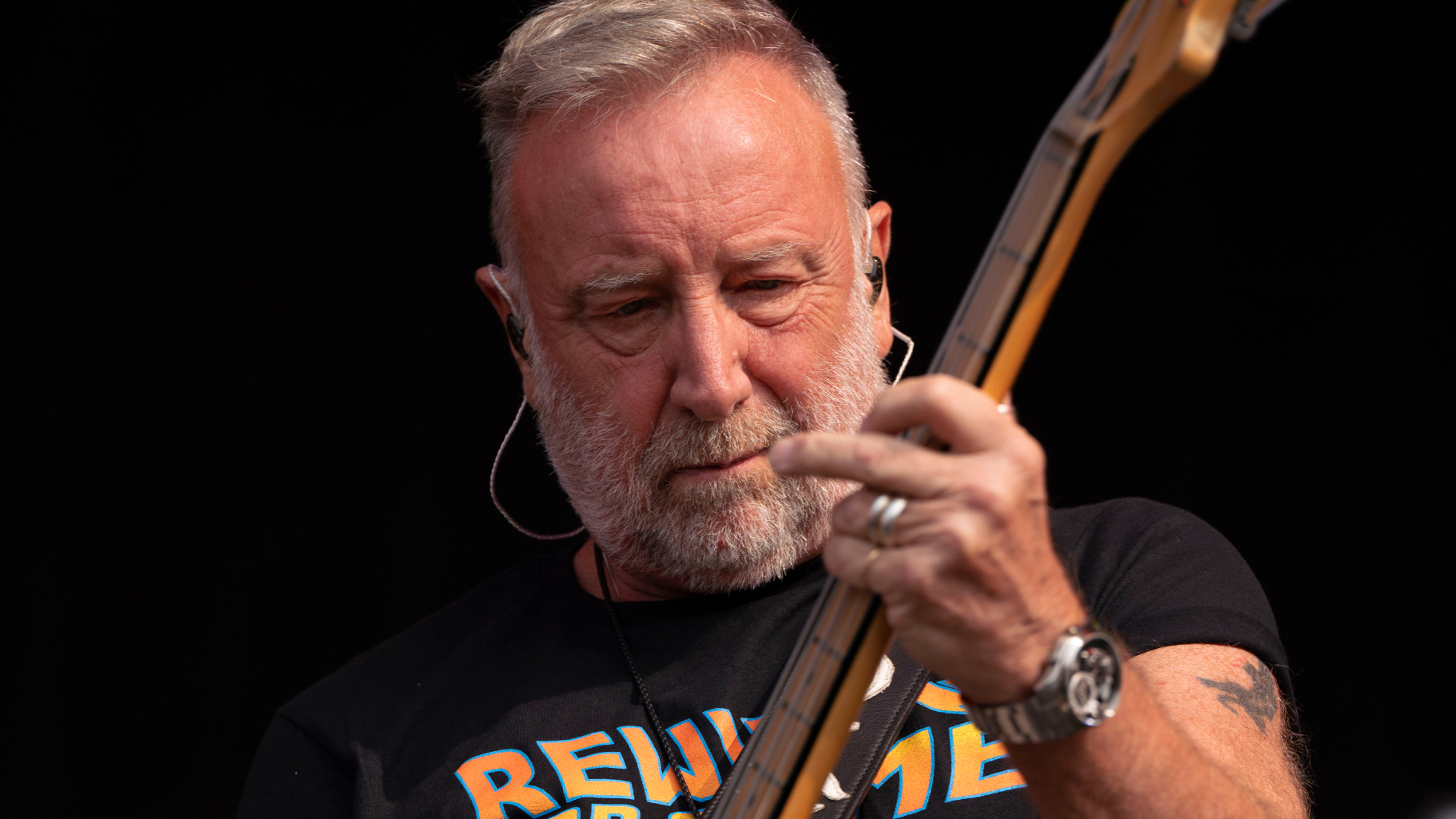
![PRS Archon Classic and Mark Tremonti MT 15 v2: the newly redesigned tube amps offer a host of new features and tones, with the Alter Bridge guitarist's new lunchbox head [right] featuring the Overdrive channel from his MT 100 head, and there's a half-power switch, too.](https://cdn.mos.cms.futurecdn.net/FD37q5pRLCQDhCpT8y94Zi.jpg)





